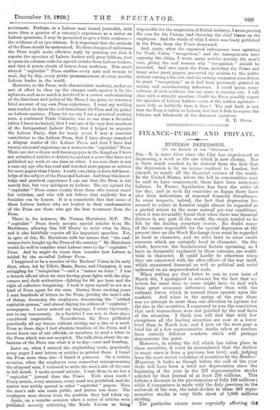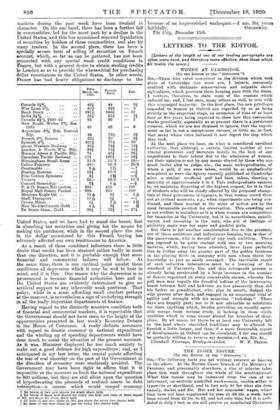FINANCE—PUBLIC AND PRIVATE.
BUSINESS DEPRESSION.
[To THE EDITOR OF THE " serciarea."1 Sin,—It is some time since the City has experienced so depressing a week as the one which is now closing. Nor is there much comfort to be derived from the fact that the depression is by no means confined to London, but extends to nearly all the financial centres of the world. In the United States, where the fall in commodities may be said to have commenced, there have been numerous failures. In France liquidation has been the order of the day, and in such far countries as Japan there have also been indications of renewed financial disturbance. In some respects, indeed, the fact that depression has seemed to centre in London might almost be regarded as a partial return to the more normal pre-war conditions, when it was invariably found that when there was financial distress in any part of the world, the strain tended to be felt by the leading monetary centre. No doubt many of the causes responsible for the special depression at the present time on the Stock Exchange here must be regarded as local in character, and we refer later to some credit rumours which are certainly local in character. On the whole, however, the fundamental factors operating, as I have so frequently explained in these columns, are world- wide in character. It could hardly be otherwise when they are connected with the after-effects of the war itself, which occasioned financial as well as political and social upheaval on an unprecedented scale. When writing my first letter to you in your issue of March 6th, I apologized in advance for the fact that my letters for some time to come might have to deal with these great economic influences rather than with the ordinary forces which in normal times operate upon the markets. And when in the spring of the year there was an attempt in more than one direction to operate for the rise in the securities, I expressed to you the conviction that such transactions were not justified by the real facts of the situation. I think you will find that with few exceptions all the leading securities are now at a lower level than in March last, and I give on the next page a brief list of a few representative stocks taken at random from entirely different markets which will perhaps demonstrate the point. Moreover, in noting the fall which has taken place in these securities, it must be remembered that the decline in many cases is from a previous low level ; and, judging from the most recent valuation of securities by the Bankers' Magazine, it looks as though before the end of the year there will have been a total net depreciation since the beginning of the year in the 387 representative stocks selected by that journal of at least 250 millions. This follows a decrease in the previous year of fully 166 millions ; while if comparison is made with the July previous to the outbreak of the war, the total decline in these 387 repre- sentative stocks is very little short of 1,000 millions sterling. The particular causes more especially affecting the markets during the past week have been twofold in character. On the one hand, there has been a further fall in commodities, led for the most part by a decline in the United States, and this has occasioned renewed liquidation of securities by holders of these commodities, and also by many traders. In the second place, there has been a specially severe bout of selling of securities on French account, which, so far as can be gathered, has not been connected with any special weak credit conditions in France, but with a general desire to obtain sterling credits In London so as to provide the wherewithal for purchasing dollar remittances to the United States. In other words,
•
r ranee nas naa neavy oengations to aiscnarge DO we Prim
March let. resent
Pprice.
Pall.
1920.
Consols 24% .. 491 44 — 51 War Loan 5% .. .. 871 824 — 5 Bank Stock .. .. .. 1874 1661 — 21 India 31% .. .. .. 55/ 531 — 21 Canada 41% 1920-25 .. 92 90 — 2 New South Wales 3% Ins.
1935 .. .. .. 67 62 — 5 Argentine 5% Nth. Central Rly. .. .. .. 84 781 — 5 French 3% Rentes .. 32/ 26 — 6 Spanish 4% .. .. .. 107/ 771 — 30 Great Western Railway .. 854 721 — 121 London & North-W'n. Rly. 894 74/ — 141 Buenos Ayres & Pacific Rly. 74 451 — 284 Canadian Pacific Railway .. 171 1601 — 104 Birmingham Small Arms .. 31/3 13/3 — 18/- Calico Printers .. .. 40/- 19/9 — 20/3 Courtaulds .. .. ..
8 .* 1 fi
--
Dunlop Rubber .. ..
121
17/6
—t
Fine Cotton Spinners .. 41 111 —§ Vickers .. .. .. 35/- 19/9 — 15/3 Cunard Steamship .. .. 24 1* —§
P. & 0. Steam Navigation ..
605 415 —190 Royal Mail Steam Packet .. 205 105 —100 Mexican Eagle Oil .. .. 11* 94 — 1 Shell Transport .. ..
1121
54 —II Crown Mines.. .. .. 41 2*
— 144
New Modderfontein Gold ..
4 -15,3
31 — 11 De Beers Cons., Defd. .. 291 124 — 174
United States, and we have had to stand the brunt, first in absorbing her securities and giving her the means for making the purchases, while in the second place the rise in the dollar occasioned by this French buying has adversely affected our own remittances to America.
As a result of these combined influences there is little doubt that credit has been strained rather badly in more than one direction, and it is probable enough that some financial and commercial failures will follow. At the same time, there is one cardinal point amidst these conditions of depression which it may be well to bear in mind, and it is this. One reason why the depression is so pronounced is because financial authorities here and in the United States are evidently determined to give no artificial support to any inherently weak positions. That policy, while in a sense affording small comfort perhaps at the moment, is nevertheless a sign of underlying strength in all the really important departments of finance Having regard to the distinctly sensitive condition both of financial and commercial markets, it is regrettable that the Government should not have risen to the height of the opportunities presented in last week's Economy Debate in the House of Commons. A really definite assurance with regard to drastic economy in national expenditure and the winding up of spending departments would have done much to assist the situation at the present moment. As it was, Ministers displayed far too much anxiety to make out a good defence for high expenditure ; and, as I anticipated in my last letter, the crucial points affording the test of real sincerity on the part of the Government in the direction of economy were studiously avoided. The Government may have been right to affirm that it is impossible at the moment to limit the national expenditure to 800 millions, but they are still silent upon the question of hypothecating the proceeds of realized assets to debt redemption—a course which would compel economy
Mt bonus of two new shares for every share held.
Mx bonus of three new shares for every one held and issue of three shares at 80s. per share for every share held. Ex issue of one new share at 30s. per share for every two shares held.
- Mx issue of one new share at par for every two shares held.
because of an impoverished exchequer.—I am, Sir, yours The City, December 15th.







































 Previous page
Previous page